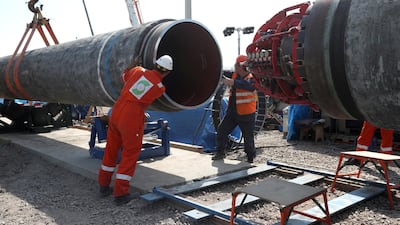A slender filament of metal, not even visible beneath the choppy waters of the Baltic, is dividing the Atlantic. US Secretary of State Anthony Blinken has warned companies building the Russia-Germany Nord Stream II gas pipeline to “immediately abandon work” or face sanctions. But this is the wrong battle at the wrong time.
The pipeline itself is both problematic and not. It is not a real threat to European energy security. Although the continent’s own gas production is declining, its energy system is far more diverse and interconnected than during the Russian gas disruptions of 2006 or 2009.
Gazprom cannot selectively pick off single European countries because of the development of reversible pipelines, including the ability to flow gas eastwards into Ukraine.
The rise of renewable energy and the construction of several new receiving terminals for liquefied natural gas give Europe more options. Its decarbonisation agenda is a clear threat to the long-term future of Russian gas exports.
If anything, Brussels now holds Moscow hostage to the economics, rather than vice versa.
However, Nord Stream II, along with the existing Nord Stream I and Turkish Stream pipeline, which began to make deliveries in January last year, do remove most of the requirement for Russian gas transit through Ukraine.
That deprives Kiev of about $2 billion to $3bn a year in fees once its current agreement runs out after 2024, an important part of government revenue that is less than $39bn this year.
More importantly, it could free President Vladimir Putin’s hand for further military adventurism against Ukraine.
Washington’s concern for European energy security was the ostensible reason for the US Senate to impose sanctions on Nord Stream II in December 2019.
France and some Eastern European countries, notably Poland and the three Baltic states, are also concerned, even if the nuclear-friendly Elysee Palace is mostly using the project as a bargaining chip with Berlin over other issues.
The pipeline is about 95 per cent complete but would have been ready by the middle of last year had it not been delayed – first by Danish concerns over its route, then by the US sanctions that prevented pipeline vessels from continuing work. The latest measures have driven out insurance, certification and engineering companies.
It is true that parts of the German establishment are too cosy with the Kremlin, notably former German chancellor Gerhard Schroder who chairs the board of Nord Stream. However, that is far from unique, with similar concerns over countries such as the UK, Italy and Hungary, not to mention prominent US Republicans including former President Donald Trump.
German Chancellor Angela Merkel’s government has remained resolute on sanctions imposed on Russia over its 2014 annexation of Crimea.
Europe, and in particular Germany, are rightly suspicious of US motives. Firstly, domestic political concerns appear uppermost in the latest decision. The Republicans had to appear tough on Russia to cover up Mr Trump’s slavish devotion to Mr Putin; now President Joe Biden's administration cannot seem soft either, with tricky negotiations with Iran in the offing.
Secondly, the initial idea of sanctions was tainted by the clear motive to promote exports of American LNG, or “molecules of freedom” as the Department of Energy described them in May 2019. From a country touting its “energy dominance”, this is a worry across the political spectrum – from national security advocates and business leaders to the Greens, who like neither pipelines nor LNG.
Thirdly, extraterritorial sanctions have become an expression of an impotent superpower’s wrath – a goal rather than a tool.
As the Iranian nuclear saga drags on, and Washington increasingly seeks to limit China’s economic reach, Europe needs to maintain its economic and energy sovereignty.
After Mr Biden may come Mr Trump again, or an acolyte or imitator or, only a little better, another George W Bush.
There are ways for Germany and the US to work constructively to prevent Moscow from again wielding the gas weapon. These include further diplomatic and economic aid to Ukraine, liberalisation, interconnection and diversification of energy supplies to Turkey and the Balkans, and reassurance that US LNG will substitute any Russian interruptions.
Germany can make it clear to Russia that the use of Nord Stream II depends on gas remaining a commercial rather than political matter, and on the absence of further military escapades in Ukraine or elsewhere.
Both sides of the Atlantic, but particularly the western side, must bear in mind the broader political context.
For the Europeans, Russia is a fact of life, albeit a troublesome neighbour but also a valuable and vital economic partner, especially in oil and gas.
But they should not have rosy thoughts about a rapprochement, a meeting of minds, until Mr Putin leaves power, and perhaps not even then.
It is important for Brussels and Washington to agree on a consensus approach to Russia.
Former US president Ronald Reagan attempted unsuccessfully to halt Soviet gas exports to Germany, and the silly, reflex opposition to Nord Stream II harks back to this Cold War mentality.
And it is a sideshow to a sideshow. Thursday’s bad-tempered meeting in Alaska between high-level American and Chinese delegations shows the incumbent and emerging superpower have partly chosen and partly stumbled into confrontation.
Beijing is a far more serious competitor to Europe and the US than Moscow, whether under Leonid Brezhnev or Mr Putin. In dealing with China, and building the future energy economy, transatlantic co-operation is essential.
Batteries, solar panels, advanced nuclear power, carbon capture, self-driving vehicles, biotechnology and space are the terrain of this struggle, more than fossil fuels.
The new energy geopolitics is a multifaceted mix of competition and collaboration over climate, jobs and technology.
Squabbles between the western democracies over a piece of steel seem quaintly 20th century.
Robin Mills is chief executive of Qamar Energy and author of The Myth of the Oil Crisis


